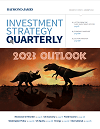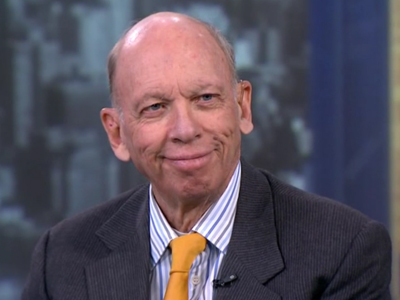by Larry Adam, Chief Investment Strategist, Raymond James
January 04, 2022
What can investors expect this year? Above-trend economic growth, at least two interest rate hikes and continued earnings strength among technology stocks, says Raymond James CIO Larry Adam.
To read the full article, see the Investment Strategy Quarterly publication linked below.
Athletes at the Olympic Winter Games will either taste the thrill of victory or the agony of defeat. The same can be said for investors, as the easy victories over the last two years will become more challenging and hard fought in the year ahead. However, we’re optimistic that the economy and financial markets are well-trained, have favorable fundamentals and are set to carry the torch for positive investment returns.
 1. The U.S. economy is ready to take off
1. The U.S. economy is ready to take off
The economy is ready to take off and fly at an above-trend pace (expected 2022 GDP: ~3.5%) for the second consecutive year – but this time on its own, without policy support. In fact, this is the first time annual economic growth will soar above 3.5% for back-to-back years since 2000. Variants may cause some resistance, but COVID’s gradual transition from a pandemic to endemic state should be the biggest tailwind.
 2. The Fed must adeptly navigate the fast-moving economy
2. The Fed must adeptly navigate the fast-moving economy
The global economy is racing to reopen, and pent-up demand is pushing inflation like the g-forces in a tight turn. The inflationary surge is also pushing the Fed into its next heat – tightening monetary policy. The Fed will be the brakeman, deciding if, and when, to slow the pace of growth to throttle back on inflation. We see the Fed steering in a less aggressive, more pragmatic manner than many expect, anticipating at least two well-telegraphed interest rate hikes that the market and economy will absorb like an expected bump in a bobsled run.
 3. Yields will swerve between the gates
3. Yields will swerve between the gates
The 10-year Treasury yield has failed to reach its previous peak rate after each successive tightening cycle. This cycle will be no different. Structural factors like government debt, demographics, and globalization trends should keep the 10-year Treasury yield zig zagging within a tightly gated range, ending the year around 1.9%.
 4. The Democratic “Blue Wave” is skating on thin ice
4. The Democratic “Blue Wave” is skating on thin ice
History suggests the incumbent party tends to lose seats in the House of Representatives in midterm elections, making gridlock the anticipated outcome. With politics in the neutral zone, few major policy shifts should make it off the boards. Market fans are likely to view this positively.
 5. Equities’ transition from power and speed to targeted precision
5. Equities’ transition from power and speed to targeted precision
The market is transitioning to a period where precision and steadiness are needed. Investors must aim carefully at the right sectors and companies. We have our sights set on more cyclical sectors, as their earnings should benefit from above-trend economic growth. The continuation of shareholder-friendly actions and a still low interest rate environment should support the S&P 500’s course to our year-end target of 5,053.
 6. Sector exposure will steer small cap in the right direction
6. Sector exposure will steer small cap in the right direction
Small-cap returns did not travel on the optimal line down the course in 2021. Given our economic growth expectations for this year, especially the uptick in services spending, small-cap equities should offer investors an edge. The asset class’s shell of a sled is composed of some of our preferred cyclical areas of the economy (e.g., Industrials, Financials, Energy). Relative to the S&P 500, valuations are trading at the lowest level on record, which also enhances our confidence they’ll come from behind.
 7. There are no “bindings” on technological reinvention and adoption
7. There are no “bindings” on technological reinvention and adoption
Just as the difficulty of the gravity-defying snowboarding stunts has increased, technology keeps reinventing itself, making revolutionary contributions to productivity. Rookies like Metaverse are joining veteran catalysts such as cloud computing and 5G, pushing business plans for future tech spending to record levels. There’s no limit to the stunts the sector can do, and its earnings power should continue to justify the seemingly lofty valuations.
 8. Focusing on U.S. equities’ consistent stride
8. Focusing on U.S. equities’ consistent stride
It’s hard to pick a region as a short-term equity market winner given that varying supply chain bottlenecks, COVID surges, and differing policy responses are causing false starts. However, long-term investors have more time and space to excel. Profitability ratios give the U.S. the inside track versus other developed markets, though Asian emerging markets are gaining on it.
 9. Oil price dynamics will find their balance
9. Oil price dynamics will find their balance
The energy market’s performance in the recovery’s routine has been anything but smooth. However, supply and demand dynamics should find their balance and help oil prices avoid a fall. We expect oil prices to remain around the $80 range. Prices at this level should no longer lead to deductions in the growing renewable energy space and should instead encourage the development of these markets.
 10. Look below the surface for opportunities
10. Look below the surface for opportunities
There’s a lot going on below the surface of our targets, and there are plenty of opportunities to add value to a portfolio. The news headlines will still come sweeping in – COVID variants, Fed tightening, mid-term elections, geopolitics – adding more or less friction to the markets. For this reason, active management and selectivity are prudent.
No resting on laurels as the new year begins
We hope the resilient economy and record bull market will proudly carry the torch into 2022, but there’s always the fear of a tumble on the slippery slope. When you’re racing toward your investment goals, stick to your game plan and listen to coaching from your trusted advisor.
Read the full Investment Strategy Quarterly
All expressions of opinion reflect the judgment the author, the Investment Strategy Committee, or the Chief Investment Office and are subject to change. Past performance may not be indicative of future results. There is no assurance any of the trends mentioned will continue or forecasts will occur. The performance mentioned does not include fees and charges which would reduce an investor’s return. Dividends are not guaranteed and will fluctuate. Investing involves risk including the possible loss of capital. Asset allocation and diversification do not guarantee a profit nor protect against loss. Investing in certain sectors may involve additional risks and may not be appropriate for all investors. The indexes mentioned are unmanaged and an investment cannot be made directly into them. The S&P 500 is an unmanaged index of 500 widely held securities.
Copyright © Raymond James














